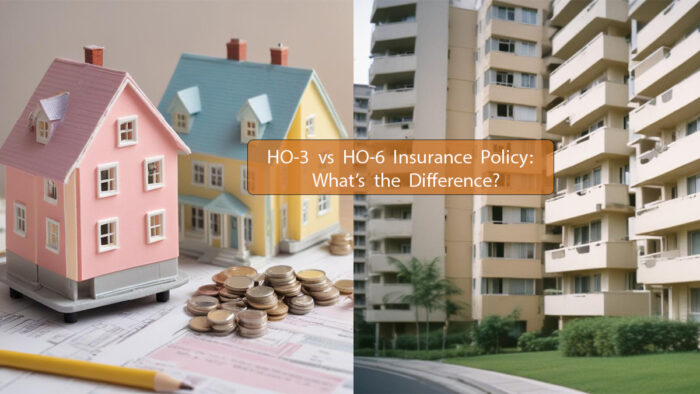If you are new to home shopping, you may have a hard time handling the two types of home insurance policies you will likely encounter. You may need to decide what home insurance policy is best for your current policy. HO-3 and HO-6 are two of the most common types of home insurance policies, but what is the difference between them?

It is always advisable to get home insurance coverage, even while shopping for a new home. Whether your home is a condominium community or a home with a picket fence, you still need to know the differences between these home insurance policies to help you make the best decision for your home. You need to insure your home or condo, regardless of which you select.
What is an HO-3 and HO-6 Home Insurance Policy?
When you think of being a homeowner, you may be thinking of getting a two-story home with a garage, a picket fence, and a family standing outside.
Although homes like this exist, you still need HO-3 home insurance policy coverage for your home. Other homes, like condos and townhouses, need HO-6 home insurance coverage.
What is an HO-3 Home Insurance Policy?
When you purchase a house, you need to shield it from slabs, the roof, and everything in between. HO-3 home insurance covers different types of losses, including the following:
- Your house itself
- Personal property
- Loss of use
- Other structures
- Personal liability
- Medical payments
This home insurance policy works on an ‘open peril’ basis, meaning it covers everything that happens to your home except there’s an exception in your policy. Another part of HO-3 home insurance is that it covers your personal property.
This acts on a ‘named peril’ basis. This means that this part has specific covered properties outlined in the policy. The following are the named perils covered by this part of the HO-3 policy:
- Windstorm or hailstorm
- Electric current
- Cracking and bulging
- Fire and lightning
- Weight of ice and snow
- Riot or civil commotion
- Volcanic eruption
- Water or stream
- Falling objects
If any of these events happen, your policy will cover damages, repairs, and replacements for damaged properties. However, events that are listed in your policy will not be covered; these events are considered an exclusion.
What is an HO-6 Home Insurance Policy?
If you live in a condo, you do not own the building, nor do you own the land it sits on. The owner of the property takes care of the insurance for your condo. The only thing you need to insure is your property.
This is where an HO-6 comes in. It is designed to insure only your properties. An HO-6 home insurance policy covers everything except your home. Some of the things it covers include:
- Personal Property
- Loss of Use
- Physical Damage
- Liability
- Medical payments to others
Everything relating to any of its listed coverages will be covered under this home insurance policy. While the condo or townhouse is an exception, the property owner’s insurance policy covers any damages.
HO-3 vs. HO-6 Home Insurance Policy: What’s the Difference?
The main difference between HO-3 and HO-6 home insurance is that an HO-3 policy is specifically designed to cover a house, while an HO-6 policy is meant to cover townhouses and condominiums.
If you live in a single-family home, an HO-3 insurance policy is a good idea because you only need coverage for your home and everything in it. If you live in a townhouse or condominium, an HO-6 insurance policy is a good idea because you need only your belongings to be covered.
The table below shows the differences between these two home insurance policies.
| Category | HO-3 Home Insurance Policy | HO-6 Home Insurance Policy |
| Reimbursement | Actual cash value | ACV/replacement cost |
| Personal property | Named peril | Named peril |
| Cost | More costly | Less costly |
| Insured property | Single-family dwellings | Condos and townhomes |
| Dwelling coverage | Open peril | Walls in coverage only |
| Am I required to carry? | Yes | Yes |
You can determine what insurance coverage is best for your situation using these differences. Also, it shows what situation each of these home insurance policies is best and meant for.



